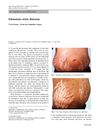 February 2002 in “Dermatologic Surgery”
February 2002 in “Dermatologic Surgery” Best hair transplant results happen when tissues are least damaged.
 58 citations,
November 2000 in “Journal of the American Veterinary Medical Association”
58 citations,
November 2000 in “Journal of the American Veterinary Medical Association” Lufenuron effectively and quickly treats fungal infections in dogs and cats without side effects.
 April 2017 in “Australasian Journal of Dermatology”
April 2017 in “Australasian Journal of Dermatology” Different skin conditions show distinct types of vessel inflammation, a new quality of life index for vulval disease is reliable, a certain intrauterine system might be linked to chronic vaginal yeast infections, and oral minoxidil reduces hair loss in women.
 6 citations,
February 2010 in “Journal of The American Academy of Dermatology”
6 citations,
February 2010 in “Journal of The American Academy of Dermatology” A woman had a rare skin condition with recurring painful nodules that heal in 6 weeks, often without needing treatment.
 May 1985 in “Journal of The American Academy of Dermatology”
May 1985 in “Journal of The American Academy of Dermatology” The book "Diseases of the Hair and Scalp" has outdated information and confusing content, but may still offer some insights.
 1 citations,
December 2018 in “Journal of cutaneous pathology”
1 citations,
December 2018 in “Journal of cutaneous pathology” Some skin growths with mucin can form hair follicles and resemble skin cancer, but a special stain can help tell them apart.
 64 citations,
January 2004 in “American journal of clinical dermatology”
64 citations,
January 2004 in “American journal of clinical dermatology” Folliculitis is an inflammation of hair follicles that requires proper diagnosis and treatment based on the specific cause.
 April 2019 in “The journal of investigative dermatology/Journal of investigative dermatology”
April 2019 in “The journal of investigative dermatology/Journal of investigative dermatology” DHT may reduce inflammation caused by certain bacteria in skin cells.
2 citations,
June 2018 in “Advances in Cosmetic Surgery” Neck rejuvenation involves tailored techniques to improve skin, muscle, and fat appearance.
3 citations,
December 2019 in “Lupus” Hydroxychloroquine effectively treated a woman's lupus skin issues and hair loss.
 32 citations,
June 2017 in “Journal of infection/The Journal of infection”
32 citations,
June 2017 in “Journal of infection/The Journal of infection” The document concludes that terbinafine is effective for treating scalp fungal infections in children and recommends not excluding them from school during treatment, while also highlighting the need for updated treatment guidelines due to changing infection patterns.
 1 citations,
January 2016 in “Elsevier eBooks”
1 citations,
January 2016 in “Elsevier eBooks” The document concludes that identifying the specific cells where skin cancers begin is important for creating better prevention, detection, and treatment methods.
 10 citations,
January 2013 in “International journal of trichology”
10 citations,
January 2013 in “International journal of trichology” A woman's scalp nodules were successfully treated with antifungal and anti-lice medications, revealing a rare case of mixed piedra infection.
232 citations,
January 2002 in “Mechanisms of development” Different enzymes are active in different parts of developing mouse organs.
 1 citations,
July 2024 in “Skin Research and Technology”
1 citations,
July 2024 in “Skin Research and Technology” High-frequency ultrasound can effectively visualize and assess hair loss.
11 citations,
May 1957 in “Journal of the American Medical Association” Emollient creams prevent skin dryness and benefit from shared knowledge between cosmetic makers and doctors.

Liquid nitrogen cryotherapy is an effective treatment for alopecia areata.
 14 citations,
January 2014 in “Journal of Cutaneous and Aesthetic Surgery”
14 citations,
January 2014 in “Journal of Cutaneous and Aesthetic Surgery” Scalp Roller therapy helped improve hair growth in patients with hard-to-treat alopecia areata.
 1 citations,
January 2024 in “Skin research and technology”
1 citations,
January 2024 in “Skin research and technology” Deoxycholic acid is FDA-approved for reducing submental fat, but its mechanisms are not fully understood.
 February 2021 in “International journal of men's social and community health”
February 2021 in “International journal of men's social and community health” Online forums help understand men's concerns about baldness and show the need for better support that changes how baldness is viewed.
 July 2022 in “Berkala Ilmu Kesehatan Kulit dan Kelamin/Berkala ilmu kesehatan kulit dan kelamin (Periodical of dermatology and venerology)”
July 2022 in “Berkala Ilmu Kesehatan Kulit dan Kelamin/Berkala ilmu kesehatan kulit dan kelamin (Periodical of dermatology and venerology)” Most tinea capitis patients were young boys with cat contact, had scaly patches caused by Microsporum canis, and improved with griseofulvin treatment.
2 citations,
January 2017 in “Clinical approaches and procedures in cosmetic dermatology” The document concludes that understanding skin structure is essential for effective cosmetic treatments.
2 citations,
January 2017 in “Indian dermatology online journal” A woman had a rare infection of both white piedra and head lice, which improved after 10 weeks of antifungal treatment.
November 2016 in “Oncology Letters” Milia may come from the outer part of the hair follicle.
 3 citations,
April 2012 in “Internal and Emergency Medicine”
3 citations,
April 2012 in “Internal and Emergency Medicine” The girl's swelling and skin issues improved with fluid restriction and diuretics.
 June 2023 in “British journal of dermatology/British journal of dermatology, Supplement”
June 2023 in “British journal of dermatology/British journal of dermatology, Supplement” A woman with rheumatoid arthritis had a unique type of scarring hair loss not caused by infection, requiring early treatment to avoid permanent hair loss.
 2 citations,
March 2023 in “JAAD case reports”
2 citations,
March 2023 in “JAAD case reports” Hair repigmentation can indicate malignancy and should be investigated.
 3 citations,
January 2021 in “Journal of Research in Medical Sciences”
3 citations,
January 2021 in “Journal of Research in Medical Sciences” Certain medications can impact metabolic syndrome, with some improving conditions like high blood sugar and others having no effect.
 January 2023 in “Indian Dermatology Online Journal”
January 2023 in “Indian Dermatology Online Journal” Micropigmentation is a cosmetic tattooing technique for hiding skin issues and creating permanent makeup, but it can have side effects.
 April 2022 in “Research Square (Research Square)”
April 2022 in “Research Square (Research Square)” The conclusion is that treating scalp AVF caused by hair transplantation with endovascular methods like coiling is safe and effective.























